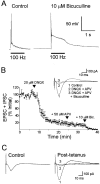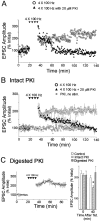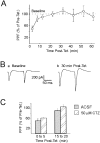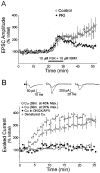Postsynaptic application of a peptide inhibitor of cAMP-dependent protein kinase blocks expression of long-lasting synaptic potentiation in hippocampal neurons
- PMID: 12598602
- PMCID: PMC6742281
- DOI: 10.1523/JNEUROSCI.23-04-01142.2003
Postsynaptic application of a peptide inhibitor of cAMP-dependent protein kinase blocks expression of long-lasting synaptic potentiation in hippocampal neurons
Abstract
Multiple trains of high-frequency synaptic stimulation evoke long-term potentiation (LTP) of synaptic transmission in hippocampal area CA1, which has been correlated with hippocampal long-term memory and requires the activation of cAMP-dependent protein kinase (PKA). To assess whether postsynaptic PKA is necessary for the expression of LTP, we made prolonged whole-cell voltage-clamp recordings from CA1 pyramidal neurons in mouse hippocampal slices during postsynaptic infusion of cell-impermeant modulators of PKA. Repeated stimulation (four 100 Hz trains at 5 min intervals) of the Schaffer collateral pathway increased synaptically evoked EPSCs for up to 2 hr. The postsynaptic infusion of either a cell-permeant PKA inhibitor (Rp-cAMPS) or a cell-impermeant PKA inhibitor (PKI(6-22)) did not alter post-tetanic peak potentiation, but it caused significant decay of EPSCs to pretetanization amplitudes within 1.5 hr. In contrast, postsynaptic infusion of PKI(6-22) did not alter a more modest, decaying form of LTP evoked by a single 100 Hz train. Paired-pulse facilitation was unchanged during most of the duration of LTP, suggesting that postsynaptic mechanisms, including PKA activation, are involved in the expression of LTP induced by multitrain stimulation. The postsynaptic infusion of a constitutively active isoform of the PKA catalytic subunit (Calpha) into CA1 pyramidal neurons increased EPSC sizes to elicit long-lasting synaptic facilitation. Thus, mimicking the activation of PKA in postsynaptic CA1 pyramidal neurons is sufficient for inducing persistent synaptic facilitation. Activation of apostsynaptic PKA is necessary for the expression of LTP in CA1 pyramidal neurons and is sufficient for initiating persistent synaptic facilitation.
Figures





Similar articles
-
Postsynaptic application of a cAMP analogue reverses long-term potentiation in hippocampal CA1 pyramidal neurons.J Neurophysiol. 2002 Jun;87(6):3018-32. doi: 10.1152/jn.2002.87.6.3018. J Neurophysiol. 2002. PMID: 12037205
-
Genetic and pharmacological demonstration of differential recruitment of cAMP-dependent protein kinases by synaptic activity.J Neurophysiol. 2000 Dec;84(6):2739-45. doi: 10.1152/jn.2000.84.6.2739. J Neurophysiol. 2000. PMID: 11110804
-
Differential maintenance and frequency-dependent tuning of LTP at hippocampal synapses of specific strains of inbred mice.J Neurophysiol. 2000 Nov;84(5):2484-93. doi: 10.1152/jn.2000.84.5.2484. J Neurophysiol. 2000. PMID: 11067991
-
Role of giant depolarizing potentials in shaping synaptic currents in the developing hippocampus.Crit Rev Neurobiol. 2006;18(1-2):13-23. doi: 10.1615/critrevneurobiol.v18.i1-2.30. Crit Rev Neurobiol. 2006. PMID: 17725505 Review.
-
Occlusion of activity dependent synaptic plasticity by late hypoxic long term potentiation after neonatal intermittent hypoxia.Exp Neurol. 2021 Mar;337:113575. doi: 10.1016/j.expneurol.2020.113575. Epub 2020 Dec 21. Exp Neurol. 2021. PMID: 33358869 Free PMC article. Review.
Cited by
-
Induction and expression rules of synaptic plasticity in hippocampal interneurons.Neuropharmacology. 2011 Apr;60(5):720-9. doi: 10.1016/j.neuropharm.2010.12.016. Epub 2010 Dec 30. Neuropharmacology. 2011. PMID: 21195098 Free PMC article. Review.
-
Age-dependent requirement of AKAP150-anchored PKA and GluR2-lacking AMPA receptors in LTP.EMBO J. 2007 Nov 28;26(23):4879-90. doi: 10.1038/sj.emboj.7601884. Epub 2007 Nov 1. EMBO J. 2007. PMID: 17972919 Free PMC article.
-
Signaling cascades regulating NMDA receptor sensitivity to ethanol.Neuroscientist. 2004 Aug;10(4):325-36. doi: 10.1177/1073858404263516. Neuroscientist. 2004. PMID: 15271260 Free PMC article. Review.
-
Proteasome inhibition enhances the induction and impairs the maintenance of late-phase long-term potentiation.Learn Mem. 2008 Apr 25;15(5):335-47. doi: 10.1101/lm.984508. Print 2008 May. Learn Mem. 2008. PMID: 18441292 Free PMC article.
-
Metaplasticity of the late-phase of long-term potentiation: a critical role for protein kinase A in synaptic tagging.Eur J Neurosci. 2006 Apr;23(7):1784-94. doi: 10.1111/j.1460-9568.2006.04707.x. Eur J Neurosci. 2006. PMID: 16623835 Free PMC article.
References
-
- Abel T, Nguyen PV, Barad M, Deuel TA, Kandel ER, Bourtchouladze R. Genetic demonstration of a role for PKA in the late phase of LTP and in hippocampus-based long-term memory. Cell. 1997;88:615–626. - PubMed
-
- Arai A, Lynch G. Response to repetitive stimulation of AMPA receptors in patches excised from fields CA1 and CA3. Brain Res. 1996;716:202–206. - PubMed
-
- Bernabeu R, Bevilaqua L, Ardenghi P, Bromberg E, Schmitz P, Bianchin M, Izquierdo I, Medina JH. Involvement of hippocampal cAMP/cAMP-dependent protein kinase signaling pathways in a late memory consolidation phase of aversively motivated learning of rats. Proc Natl Acad Sci USA. 1997;94:7041–7046. - PMC - PubMed
Publication types
MeSH terms
Substances
LinkOut - more resources
Full Text Sources
Miscellaneous
